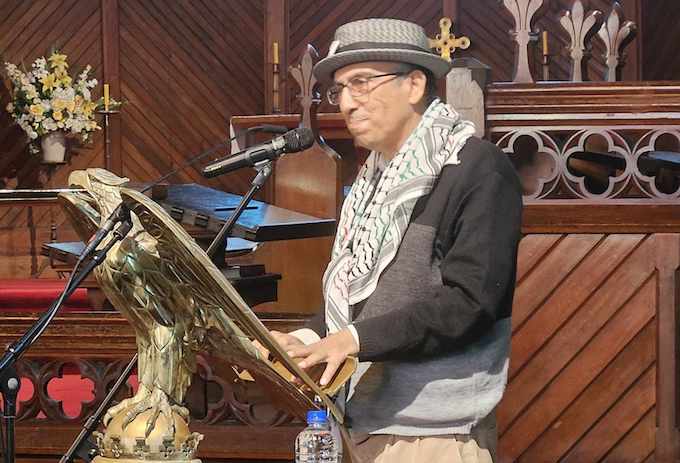For more than 76 years, Palestinians have resisted occupation, dispossession and ethnic cleansing, culminating in Israel’s genocidal war on Gaza.
Yet in the midst of this catastrophic seven months of “hell on earth”, it is a paradox that there exists an extraordinary oasis of peace and nature.
Nestling in an Al-Karkarfa hillside at the University of Bethlehem is the Palestine Institute for Biodiversity and Sustainability (PIBS), a remarkable botanical garden and animal rehabilitation unit that is an antidote for conflict and destruction.
- READ MORE: ICC prosecutor seeks arrest warrants for Israeli and Hamas leaders
- Other War on Gaza reports
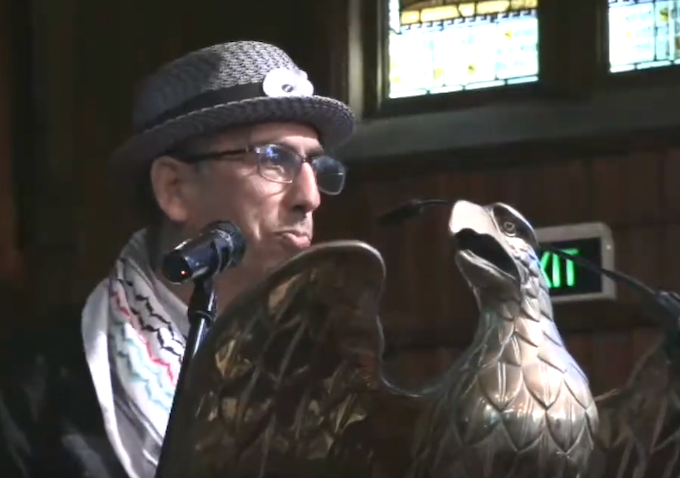
“There is both a genocide and an ecocide going on, supported by some Western governments against the will of the Western public,” says environmental justice advocate Professor Mazin Qumsiyeh, the founder and director of the institute.
It has been a hectic week for him and his wife and mentor Jessie Chang Qumsiyeh.
On Wednesday, May 15 — Nakba Day 2024 — they were in Canberra in conversation with local Palestinian, First Nations and environmental campaigners. Nakba – “the catastrophe” in English — is the day of mourning for the destruction of Palestinian society and its homeland in 1948, and the permanent displacement of a majority of the Palestinian people (14 million, of which about 5.3 million live in the “State of Palestine”.)
Three days later in Auckland, they were addressing about 250 people with a Palestinian Christian perspective on Israel’s illegal occupation of Palestine and the war at the 2024 David Wakim Memorial lecture in the historic St Mary’s-in-Holy-Trinity Church in Parnell.
This followed a lively presentation and discussion on the work of the PIBS and its volunteers at the annual general meeting of Palestine Solidarity Network Aotearoa (PSNA) along with more than 100 young and veteran activists such as chair John Minto, who had just returned from a global solidarity conference in South Africa.
Professor Mazin Qumsiyeh’s delivery of the 2024 David Wakim Memorial lecture at Saint Mary’s-in-Holy-Trinity Church in Parnell. Video: Radio Inqilaab
Environmental impacts less understood
While the horrendous social and human costs of the relentless massacres in Gaza are in daily view on the world’s television screens, the environmental impacts of the occupation and destruction of Palestine are less understood.
As Professor Qumsiyeh explains, water sources have been restricted, destroyed and polluted; habitat loss is pushing species like wolves, gazelles, and hyenas to the brink; destruction of crops and farmland drives food insecurity; and climate crisis is already impacting on Palestine and its people.
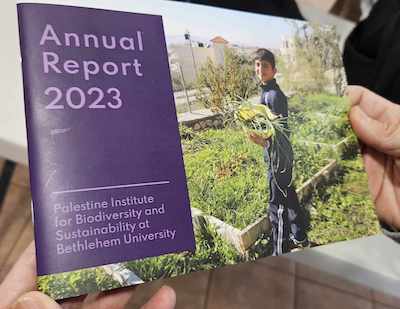
The institute was initiated in 2014 by the Qumsiyehs at Bethlehem University along with a host of volunteers and supporters. After 11 years of operation, the latest PIBS 2023 annual report provides a surprisingly up-to-date and telling preface feeding into the early part of this year.
“In 2023, there were increased restrictions on movement, settler and soldier attacks on Palestinians throughout the occupied territories, combined with the ongoing siege and strangulation of the Gaza Strip, under Israel’s extreme rightwing government.
“This led to the Gaza ghetto uprising that started on 7 October 2023. The Israeli regime’s ongoing response is a genocidal campaign in Gaza.
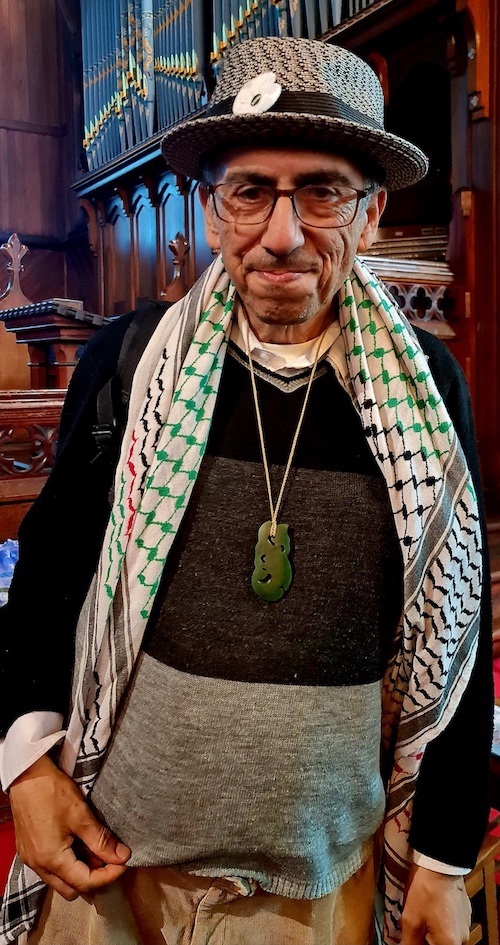
“[Since that date], 35,500 civilians were brutally killed, 79,500 were wounded (72 percent women and children) and nearly 2 million people displaced. Thousands more still lay under the rubble.
“An immense amount – nearly two-thirds – of Gaza’s infrastructure was destroyed , including 70 per cent of residential buildings, hospitals, schools, universities and government buildings.
Total food, water blockade
“Israel also imposed a total blockade of, among other things, fuel, food, water, and medicine.
“This fits the definition of genocide per international law.
“Israel also attacked the West Bank, killing hundreds of Palestinians in 2023 (and into 2024), destroyed homes and infrastructure (especially in refugee camnps), arrested thousands of innocent civilians, and ethnically cleansed communities in Area C.
“Many of these marginalised communities were those that worked with the institute on issues of biodiversity and sustainability.”
This is the context and the political environment that Professor Qumsiyeh confronts in his daily sustainability struggle. He is committed to a vision of sustainable human and natural communities, responding to the growing needs for education, community service, and protection of land and environment.
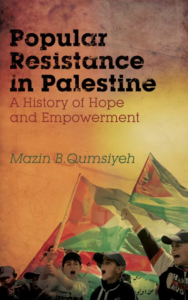
In one of his many books, Popular Resistance in Palestine: A history of Hope and Empowerment, he argues that in contrast to how Western media usually paints Palestine resistance as exclusively violent: armed resistance, suicide bombings, and rocket attacks. “In reality,” he says, “these methods have been the exception to what is a peaceful and creative
Call for immediate ceasefire
An enormous global movement has been calling for an immediate and permanent ceasefire in Gaza, to end decades of colonisation, and work toward a free Palestine that delivers sustainable peace for all in the region.
Professor Qumsiyeh reminded the audience at St Mary’s that the first Christians were in Palestine.
“The Romans used to feed us to the lions until the 4 th century,” when ancient Rome adopted Christianity and it became the Holy Roman Empire.
He spoke about how Christians had also paid a high price for Israel’s war on Gaza as well as Muslims.
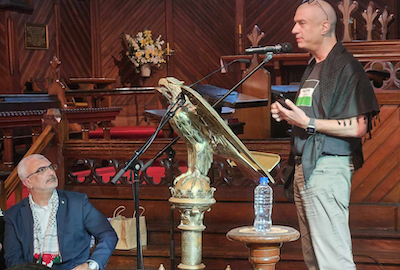
Christendom’s third oldest church and the oldest in Gaza, the Greek Orthodox church of Saint Porphyrius in the Zaytoun neighbourhood — which had served as a sanctuary for both Christians and Muslims during Israel’s periodic wars was bombed just 12 days after the start of the current war.
There had been about 1000 Christians in Gaza; 300 mosques had been bombed.
He said “everything we do is suspect, we are harassed and attacked by the Israelis”.
‘Don’t want children to be happy’
“They don’t want children to be happy, they have killed 15,000 of them in Gaza. They don’t want us to survive.”
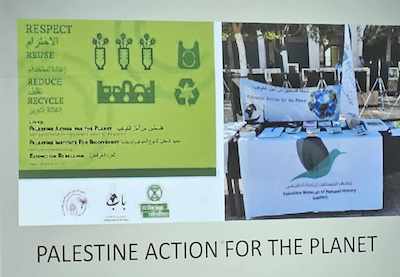
He said colonisers did not seem to like diversity — they destroy it, whether it is human diversity, biodiversity.
“Palestine is a multiethnic, multicultural and multireligious country.”
“Diversity is healthy, an equal system. We have all sorts of religions in our part of the world.
“Life would be boring if we were all the same – that’s human. A forest with only one kind of trees is not healthy.’
Professor Qumsiyeh was critical of much Western news media.
“If you watch Western media, Fox news and so on, you would be told that we are people who have been fighting for years.”
That wasn’t true. “We had the most peaceful country on earth.”
“If you go back a few years, to the Crusades, that is when political ideas from Europe such as principalities and kingdoms started to spread.”
Heading into nuclear war
He warned against a world that was rushing headlong into a nuclear war, which would be devastating for the planet – “only cockroaches can survive a nuclear war.”
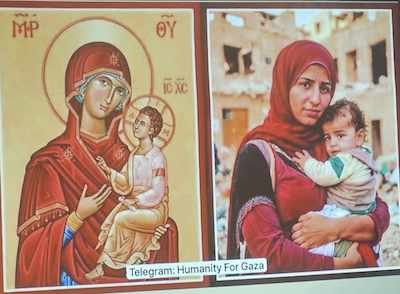
Professor Qumsiyeh likened his role to that of a shepherd, “telling the world that something must be done” to protect food sovereignty and biodiversity as “climate change is coming to us with a vengeance. So please help us achieve the goal.”
The institute says that they are leaders in “disseminating information and ideas to challenge the propaganda spread about Palestine”.
It annual report says: “We published 17 scientific articles on areas like environmental justice, protected areas, national parks, fauna, and flora.
“Our team gave over 210 talks locally, only and abroad, and over 200 interviews (radio and TV).
“We produced statements responding to attacks on institutions for higher education, natural areas, and cultural heritage.
“We published research on the impact of war, on Israel’s weaponisation of ‘nature reserves’ and ‘national parks, and a vision for peace based on justice and sustainability.”
When it is considered that Israel destroyed all 12 universities in Gaza, the sustaining work of the institute on many fronts is vital.
Professor Qumsiyeh also appealed for volunteers, interns and researchers to come to Bethlehem to help the institute to contribute to a “more liveable world”.
- More information at Palestine Nature website and info@palestinenature.org
